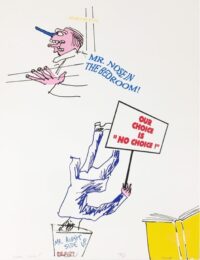

Leon Golub was an American painter known for his unflinching depictions of brutality and war. As evinced in his Mercenaries I (1976), a depiction of two Vietnam-era US soldiers carrying a charred body between them. “What is power? How is power shown?” the artist once asked. “Would we rather look at pretty colors and shapes? Do we flinch at seeing our own crimes and nightmares in ink?” Born on January 23, 1922 in Chicago, IL, he received a BA in art history from the University of Chicago before serving in the military. On the G.I. Bill, Golub received both his BFA and MFA from the School of the Art Institute of Chicago, where he met his future wife the artist Nancy Spero. As the Vietnam War escalated, Golub’s belief that it was an artist’s responsibility to confront difficult issues faced by society, took hold of his work. Over the course of his career, the artist continued to address various factions of violence and abusers of power in his paintings, with depictions of Fidel Castro, Richard Nixon, terrorism, and police violence. Golub died on August 8, 2004 in New York, NY. In 2018, his works where the subject of a selective survey exhibition held the Met Breuer “Leon Golub: Raw Nerve.” Today, the artist’s works are held in the collections of the Art Institute of Chicago, the Tate Gallery in London, the Hirshhorn Museum and Sculpture Garden in Washington, D.C., and The Museum of Modern Art in New York, among others.